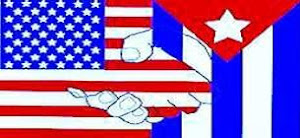Editor's Note: We want to congratulate Elena Freyre for an outstanding well written opinion editorial. Now if Washington DC would take out the pro-embargo paid earplugs it is wearing and listen....
.
Try Something New: Lift the Travel Ban
MiamiHerald.com - March 9
.
By Elena Freyre / cubaid7@bellsouth.net
.
`Only in Miami is Cuba so far away.'' On no other issue are the words of Bette Midler's song truer than on the issue of Cuba travel. The 90 miles between Florida and Cuba are the longest distance between two points, both psychologically and objectively.
This issue deserves a truthful and dispassionate examination of the facts.
Supporters of the travel ban argue that there is no law that prohibits travel to Cuba, and that, indeed, only tourism to Cuba is presently forbidden by U.S. law. The truth is that a citizen or a legal U.S. resident cannot buy a ticket to travel to Cuba unless licensed by the government. And anyone traveling to Cuba, even with a license, risks a fine and even jail time for violating the law.
Many Americans have been fined for traveling to Cuba to visit churches, birdwatch, fish, take bike rides, visit historical sites or spread the ashes of their parents.
There is a concerted effort to have us believe that tourism is the main source of income for the Cuban government. Yet the main source of income for Cuba is oil subsidies from Venezuela.
Moreover, an International Monetary Fund expert estimates that in the Caribbean, including Cuba, only 15 percent of the income from tourism stays in-country. The remainder goes to hotel chains, airlines, travel agents, tour operators, cruise ships, etc. Thus, the real income from tourism usually ranks third or fourth after remittances and exports.
There is no compelling argument for allowing U.S. citizens to travel to North Korea, Iran, Sudan and Syria while not allowing Cuba travel.
There is, however, a valid and compelling argument that U.S. citizens should not be denied a fundamental right in order to pursue foreign-policy objectives that are not related to our national interest.
A policy that has been pursued and vigorously defended but has failed to achieve its objective in 50 years is the epitome of failure. Mauricio Claver-Carone, the lobbyist for U.S.-Cuba PAC, argued in a recent column in The Miami Herald that there is no viable alternative that can be proven to be successful. But according to that logic, if a patient dies during an operation, the death would not be a failure because there is no evidence of the likely success of an alternative treatment.
Supporters of lifting the travel ban to Cuba are honest in stating there are no guarantees that allowing unrestricted Cuba travel will bring democracy to Cuba. While this may be true, that's not a valid argument to not try an alternative to our failed policy.
What is also true and should be most important is that lifting sanctions will show respect for our own democracy at home.
Here are other facts to be considered when discussing Cuba travel:
(1) Lifting the travel ban will cause from one million to 3.5 million Americans to travel to Cuba the first year. If only two million use South Florida as their jump-off point, there will be an additional 20,000 flights, supporting the jobs of a substantial number of Floridians such as pilots, flight attendants, ground crews, baggage handlers, travel agents, etc.
(2) Revenue from airport fees will be considerable.
(3) There will be a huge boost to the cruise ship industry.
(4) Florida's agricultural sales to Cuba could double as a result.
Lifting the travel ban to Cuba is an important issue that should be discussed with real facts using logic and reason, not solely ideology.
It is time that U.S. policy toward Cuba not be geared toward regime change, but to helping the Cuban people and defending the rights and liberties of all Americans.One should not preach democracy while supporting undemocratic principles.
Elena Freyre is president of the Foundation for the Normalization of U.S.-Cuba Relations.










1 Comments:
Amiable dispatch and this enter helped me alot in my college assignement. Gratefulness you for your information.
Post a Comment